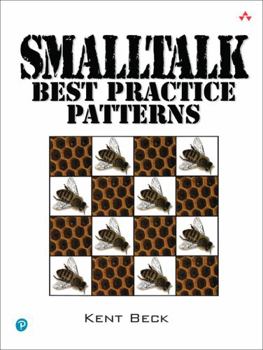SmallTalk Best Practice Patterns
This classic book is the definitive real-world style guide for better Smalltalk programming. This author presents a set of patterns that organize all the informal experience successful Smalltalk programmers have learned the hard way. When programmers understand these patterns, they can write much more effective code. The concept of Smalltalk patterns is introduced, and the book explains why they work. Next, the book introduces proven patterns for...
Format:Paperback
Language:English
ISBN:013476904X
ISBN13:9780134769042
Release Date:October 1996
Publisher:Pearson
Length:240 Pages
Weight:0.65 lbs.
Dimensions:0.7" x 7.0" x 9.3"
Customer Reviews
5 ratings
Not just for SmallTalkers
Published by Thriftbooks.com User , 23 years ago
Although I've never used SmallTalk and have read only a couple of on-line introduction chapters on Dolphin SmallTalk, I had no problems reading it and applying the patterns in another language like Java, C++ or Python.Let me put it simple: If you want to learn to think in objects, don't just read the book, do it!If you have read "Refactoring: Improving the Design of Existing Code" by Martin Fowler et al. then you'll recognize the thougts presented in this book. In this book the patterns are close to refactorings with a bunch of simple, good, readable and understandable advices to just about every little thing - it's more than a simple style guide: You'll always get told what the raison d'etre is - and if not, where to look for it.I'm currently using the book as a reference for style of OOP. From a teaching point of view, the book is also extremely useful. Kent Beck likes to ask quistions in a heuristic manner. Because of the simple approach to every day experiences of developing, all the way down to the experiences of beginners, you won't have any trouble answering these quistions. In fact you'll probably start asking quistions to yourself likewise because of the magnicifent way this mind trick works for your way of thinking in objects (or otherwise).As a developer - doing these patterns - you'll be amazed at how much little things can mean in a much bigger and more complex context, when you develop systems applying OO - especially huge systems.I am compelled to repeat: Don't just buy it, do it!
Fantastic! One of my favorites.
Published by Thriftbooks.com User , 24 years ago
I bought this book years ago from McGraw-Hill in NYC,...but I'd gladly pay double...for it today - don't be fooled by the fact that there are only 240 pages to this small, softcover book. The patterns are concise and the examples, priceless. Although I love Gamma's Design Patterns, if I were forced to be stuck on an island with one choice, it'd easily be Beck's BPP.I currently use C++ on UNIX in practice (wish there were more Smalltalk & Objective-C jobs out there), but I would still highly recommend this book for any OO-Practitioner: the lessons here can be applied to many different scenarios.Take this chance to observe the beauty of PURE OO - concise code with the semantic richness and clarity reminiscent of poetry... ...alas, if only code at work were so well crafted!This is a handbook of OO Programming. Patterns are broken into the following categories: Behavior, State, Collections, Classes, and Formatting. Each pattern is given a question/problem that the pattern answers/solves and references to other patterns are shown with page numbers.It's definitely one of those rare books that I return to over and over again... ...a classic.
Useful coding guidelines for beginners and the experienced
Published by Thriftbooks.com User , 25 years ago
Before I read Kent's book, my team had a Smalltalk coding guidelines document, a boring, cluncky text that didn't seem to help beginners write good code (mostly there so project quality plans could reference it). After I read Kent's book, I wrote a few team-specific points in the margins and declared it our new coding guidelines document.Kent's book is a pleasant, readable mix of the obvious that beginners need to know and the clever that experienced Smalltalkers can still learn from. I was surprised at the absence of Booby Woolf's strategy for classifying instance variables (as identity, status or cache; see The Smalltalk Report, June 96) and at how little there was on protocol naming. Otherwise, it seems to cover almost everything at its chosen level (which complements, instead of competing with, that of books like the Smalltalk Design Patterns Companion).
Don't let the title scare you away
Published by Thriftbooks.com User , 25 years ago
Smalltalk Best Practice Patterns isn't just for Smalltalkers---there's something here for everyone who programs. Kent's insights, experiences, and raw wit are as entertaining as they are enlightening. If you have any passion for programming, in any language, buy this book. Read it. Live it.
Excellent Smalltalk book
Published by Thriftbooks.com User , 25 years ago
This is an excellent book that all Smalltalkers should have. This book should be helpful for beginners in avoiding common programming mistakes.I am using this book heavily for all software projects I'm in. Instead of wasting time on deciding how to code things, just look at the patterns, then decide and code. The patterns presented in the book simplify software code maintaintenance. With a little work, many patterns in this book can apply to Java as well.




